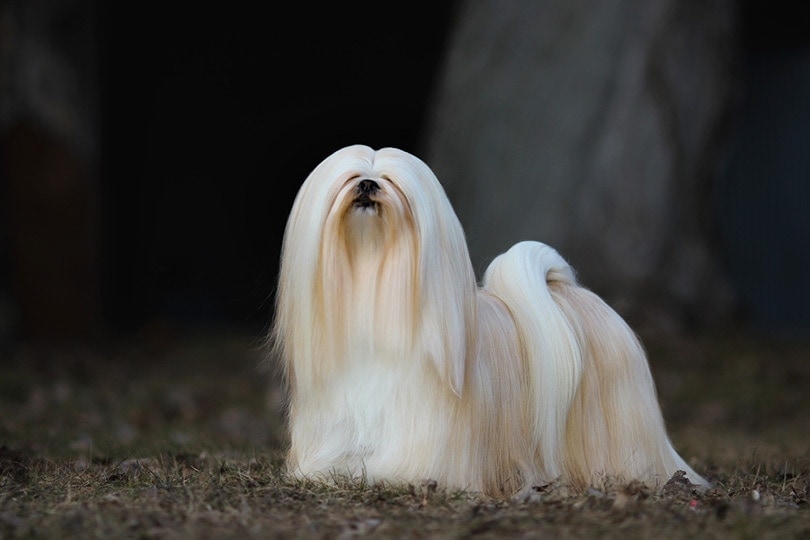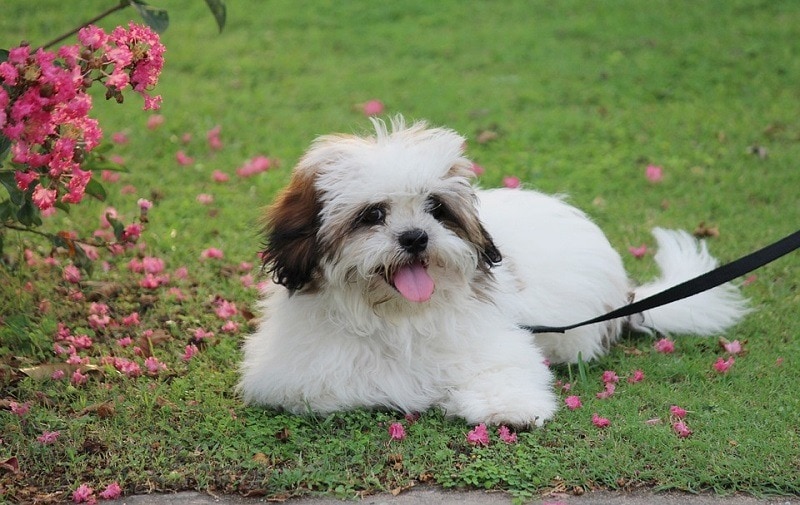Are Lhasa Apsos Smart? Breed Intelligence & History
Updated on

Click to Skip Ahead
Asking whether an animal is smart is a loaded question. A dog may be good at finding hidden objects or doing a specific task. Yet, they may find an interactive toy too complex. It’s subjective. It gets even more confusing when talking about different breeds. Some traits are heritable, which explains the jobs different canines have held during the ages.
Lhasa Apsos are an ancient breed with a history going back at least 1,000 years. However, old doesn’t necessarily mean smart. We must also defer to the pup’s role. Cognitive challenges nurture intelligence. We can safely say that a Lhasa Apso is good at being a Lhasa Apso. Let’s consider ways this breed succeeds in its role that we can relate to other dogs.
The History of the Lhasa Apso
The history of the Lhasa Apso goes back to Tibet. The American Kennel Club categorizes the breed in the Non-Sporting Group. It’s a catch-all term that includes dogs with various jobs. This pup was a sentinel in palaces, giving them their royal connection. This role requires intelligence to discern threats versus something not dangerous. It encourages independence and, thus, stubbornness.
This latter point is worth mentioning since some may think the Lhasa isn’t smart simply because the pup doesn’t respond to a command right away. Instead, it could be the dog’s nature to delay stepping up to the plate. This pooch may bark, but it’s usually to alert unless the bad habit is otherwise encouraged. That fact suggests intelligence.

The breed has retained this protective nature. It manifests itself as abundant affection for their family and a more reserved nature with strangers and other pets. Interestingly, the dog has a high prey drive yet a low wanderlust potential. This dog protects what they have but is less likely to go somewhere to find what they want. It’s almost as if they know to stay put.
Nevertheless, this history suggests the Lhasa Apso is intelligent since these dogs use a canine form of decision-making skills for the role they fulfill. We can also say they know a good thing when they have it because of their loyalty and affection for their family. This affection is well-reciprocated because of how cute they are. They are sweet dogs that deserve the love they receive.
How Scientists Measure Animal Intelligence
We must also consider how scientists view animal intelligence to get an objective answer to our question that we’ve identified as inherently subjective. While we can find common ground, it doesn’t lend itself to broad generalizations. For example, cats are good at stalking prey but won’t flush upland game for a hunting companion to take. That doesn’t make them less smart.
We can make the same assumption about canine breeds. It’s not fair to compare dogs that herd livestock with pups that hunt rats. Both require different skill sets that don’t necessarily speak to intelligence on the same scale. A better assessment is considering how well each pup does the job they were selectively bred to do.
We mentioned their role as watchdogs. They were familiar figures in the palace of the Dalai Lama, usually enjoying life indoors. It speaks to their discriminating awareness of when to bark or keep quiet and their sense of hearing.
However, having this keen sense, in itself, isn’t a measure of intelligence. How the pup uses it is a better gauge. It’s also a matter of how the animal learns from experience. That’s where the Lhasa Apso succeeds. Genetics isn’t always a reliable indicator when it comes to behavior. Heritability of some traits exists, but a pet’s environment also shapes a pup’s personality.

Owner’s Role in Intelligence
The owner’s role in intelligence begins at birth and in their early formative weeks. Puppies are born helpless, with their eyes closed. They don’t start discerning their world until around 2 weeks old. The breeder also plays a significant role by introducing the pups to novel experiences. Socialization begins around 3 weeks. That stage can profoundly impact how good of a pet the animal becomes.
The two Fear Impact Periods are critical for the same reason. A pup’s degree of fearfulness can affect an owner’s interaction with their dog. It can, in turn, influence training and the perception of an animal’s intelligence. The age when you acquire your pet is another crucial factor. Research has shown that dogs removed from their mothers and littermates before 8 weeks often develop unwanted behaviors.
Fearfulness and aggression can hinder training and nurturing the pup’s intelligence. Therefore, it behooves prospective owners to create the best situation for getting their Lhasa Apso puppy to realize the breed’s full potential. That also means you should start training and continue socialization when you bring your pooch home. Establish the house rules from day one with your Lhasa Apso.
Mental Stimulation
The Lhasa Apso is relatively sensitive to harsh words. This dog isn’t tolerant of being alone. Therefore, mental stimulation or enrichment is imperative for the pup’s well-being. That’s especially true with an intelligent breed like this one. Walks are an excellent way to introduce your pet to new things and curb fearfulness. The more exposure your pup gets, the more it helps them hone their cognitive skills.
Research has shown that the Lhasa Apso isn’t high on the list of intelligent canine breeds. The Border Collie is at the head of the class. This dog sits at 68th. However, the breeds in the top spots have challenging jobs, such as the herding skills of Border Collies and Shetland Sheepdogs with the hunting role of Poodles and Labrador Retrievers. That makes enrichment even more critical for your pup.
Your interaction with your Lhasa Apso can also prevent separation anxiety. This dog has also been an animal companion. They get quite attached to their caregivers. This pup fares best in an active family who can lavish attention on this pooch. Using treats as training aids can make learning tricks and commands easier. Your pup will make associations and further their cognitive skills.
Final Thoughts
The Lhasa Apso is an intelligent dog, capable of learning many tricks and commands. The breed’s history as a watchdog has sharpened its ability to distinguish threats from non-threats. This pup excels at this role, making the animal smart as a sentinel. Intelligence is a relative term. However, it’s safe to say that these dogs are intelligent in doing what they were bred for.
Featured Image Credit: Alexas Fotos, Pexels












